-
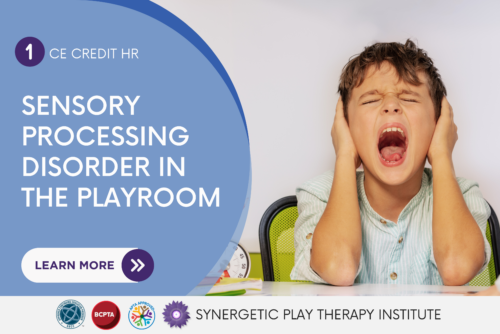
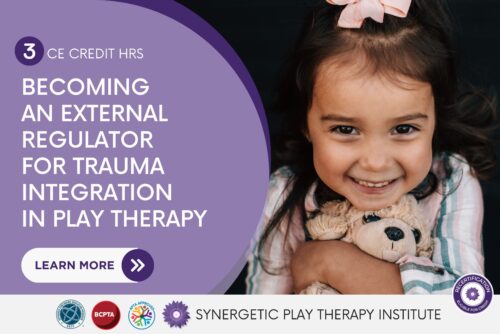 Research in neuroscience and interpersonal neurobiology sheds light on the need for the play therapist to act as the external regulator supporting the child to move towards the intensity they are experiencing allowing for integration. This 3 hour video course explores this need during trauma integration for two primary reasons: 1) The child need to borrow the play therapist’s regulatory capacity as they work through their traumatic thoughts, feelings and sensations in play therapy and 2) The play therapist’s ability to regulate themselves during the intensity increases the capacity for presence and attunement with the child, while simultaneously supporting the health and longevity of their own nervous system. Without the ability of the play therapist to become the external regulator for the intensity that arises during trauma integration, both the child and the play therapist are at risk for emotional flooding and high levels of dysregulation in their nervous systems. Over time, this can significantly impact a play therapist’s longevity in the field, as well as the ability to stay attuned and present to a child in sessions. This course is a recording of a 3 hour live webinar with Trusted Provider Network. See course details below.
Research in neuroscience and interpersonal neurobiology sheds light on the need for the play therapist to act as the external regulator supporting the child to move towards the intensity they are experiencing allowing for integration. This 3 hour video course explores this need during trauma integration for two primary reasons: 1) The child need to borrow the play therapist’s regulatory capacity as they work through their traumatic thoughts, feelings and sensations in play therapy and 2) The play therapist’s ability to regulate themselves during the intensity increases the capacity for presence and attunement with the child, while simultaneously supporting the health and longevity of their own nervous system. Without the ability of the play therapist to become the external regulator for the intensity that arises during trauma integration, both the child and the play therapist are at risk for emotional flooding and high levels of dysregulation in their nervous systems. Over time, this can significantly impact a play therapist’s longevity in the field, as well as the ability to stay attuned and present to a child in sessions. This course is a recording of a 3 hour live webinar with Trusted Provider Network. See course details below. This course supports play therapists as they learn about setting boundaries from a neurobiological perspective, keeping the child’s brain and nervous system activation in mind! Drawing from Interpersonal Neurobiology and Synergetic Play Therapy®, participants will learn how to set boundaries without shaming the child or stopping the child’s play, allowing for deeper integration and connection. Working with emotional flooding (the child’s and the therapist’s) will also be explored. Please scroll down for course details.
This course supports play therapists as they learn about setting boundaries from a neurobiological perspective, keeping the child’s brain and nervous system activation in mind! Drawing from Interpersonal Neurobiology and Synergetic Play Therapy®, participants will learn how to set boundaries without shaming the child or stopping the child’s play, allowing for deeper integration and connection. Working with emotional flooding (the child’s and the therapist’s) will also be explored. Please scroll down for course details.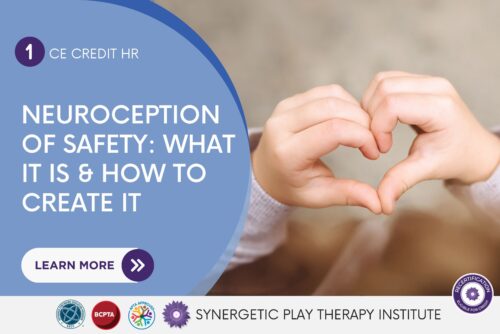 Helping a child heal involves helping them be themselves. One of the best ways to foster this type of environment is to cultivate safety. The therapist knowing the playroom is safe is not enough; the child must know it, too. This course explores what a neuroception of safety is and how to create it within the child and yourself.
Helping a child heal involves helping them be themselves. One of the best ways to foster this type of environment is to cultivate safety. The therapist knowing the playroom is safe is not enough; the child must know it, too. This course explores what a neuroception of safety is and how to create it within the child and yourself. Divorce. The “D” word. The end of the marital road. A happily ever after run amok. It’s something that often gets a bad rap, especially when we think of the children stuck in the middle. But divorce, while it can be devastating to some kids, can also be a relief for others. Children’s perceptions are not all the same. This course explores how to support children in play therapy when they are experiencing divorce and separation.
Divorce. The “D” word. The end of the marital road. A happily ever after run amok. It’s something that often gets a bad rap, especially when we think of the children stuck in the middle. But divorce, while it can be devastating to some kids, can also be a relief for others. Children’s perceptions are not all the same. This course explores how to support children in play therapy when they are experiencing divorce and separation.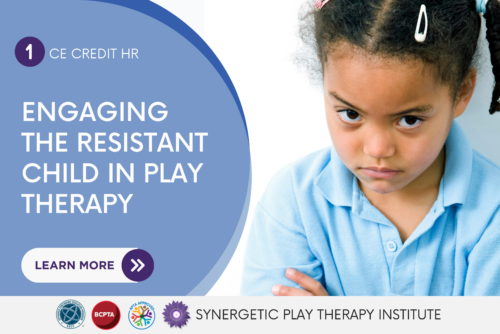 Every therapist has been there – in a session with a child who doesn’t want to come in the room, a child who doesn’t want to do the task, a child who only wants to avoid the issue. This course explores what to do when a child client’s language and behavior say “no.” Join us as we explore resistance, with a focus on differentiating resistance from avoidance and differentiating resistance from the dorsal collapse in the nervous system. Emotional flooding is explored as well.
Every therapist has been there – in a session with a child who doesn’t want to come in the room, a child who doesn’t want to do the task, a child who only wants to avoid the issue. This course explores what to do when a child client’s language and behavior say “no.” Join us as we explore resistance, with a focus on differentiating resistance from avoidance and differentiating resistance from the dorsal collapse in the nervous system. Emotional flooding is explored as well.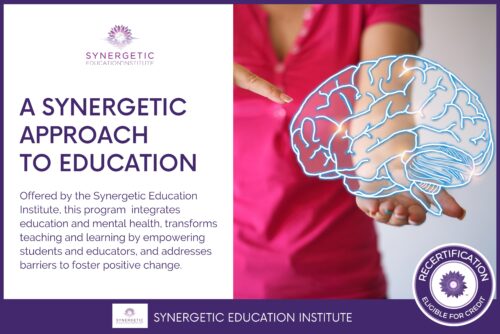
This program is for you if you work IN SCHOOLS (as a school counselor, social worker or psychologist, or a school-based mental health professional) or if you COLLABORATE WITH educators or schools!
**For all program details and dates of when this program is offered, please visit the Synergetic Education Institute's website**
A Synergetic Approach to Education (formerly One Foot in Education: Exploring Education Through an SPT Lens) offered by our sister institute, the Synergetic Education Institute, is a distinct and transformative approach to learning and teaching, working at the intersection of education and mental health! Synergetic educators recognize that the collaborative efforts of educators, students, classrooms, and educational systems produce a more substantial impact than individual contributions. This approach spans the landscape of working with students and perceived challenges and barriers, considering all aspects of learners and the learning environment. It incorporates neuroscience and nervous system regulation research with empowerment practices to create positive change within the immediate environment while maintaining a broader perspective using integrated and differentiated approaches. You will delve into strategies designed for educational settings that promote trauma-informed, social-emotional support within schools. You'll learn to implement these strategies as well as understand the neuroscience behind them, empowering you to support others in deepening their knowledge and awareness. You will also learn how to...- Implement approaches based on neuroscience that support the development of self-regulation skills, including critical skills that are often missing from SEL programming.
- Support educators in understanding how to prepare brains and bodies to learn, including articulating the links between neurophysiological states and classroom behaviors
- Identify the dynamics behind complex student-adult relationships and how to shift these challenging interactions.
- Increase feelings of safety and belonging for students and adults
- Implement small shifts in daily routines that include explicitly teaching critical skills using both "top-down" and "bottom-up" approaches.
- Reframe “resistance” to meeting educators at their level of readiness.
- Embody Synergetic Play Therapy® principles and collaborate with teachers to empower them and shift their perceptions of students
Program Prerequisites: This program requires that you have taken a Level 1 Introduction to Synergetic Play Therapy® program. This includes the completion of one of the following:- Online or In-Person Introduction to Synergetic Play Therapy® program
- Six-Day Synergetic Play Therapy® Intensive Training (no longer offered)
- Synergetic Play Therapy® Supplemental Course (no longer offered)
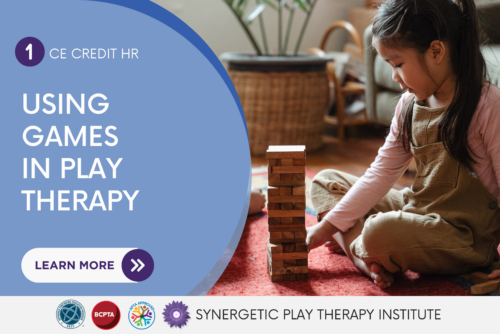 From a stroll through the Lollipop woods of Candyland to a fight over the Thimble in Monopoly, games are part of childhood. In the playroom, certain games are more commonly used than others. How do we use chess as a pawn in our therapeutic healing? How can we call on checkers to check on the child’s state of regulation? What does a game tell us about a child’s emotional world? This webinar explores these questions and more!
From a stroll through the Lollipop woods of Candyland to a fight over the Thimble in Monopoly, games are part of childhood. In the playroom, certain games are more commonly used than others. How do we use chess as a pawn in our therapeutic healing? How can we call on checkers to check on the child’s state of regulation? What does a game tell us about a child’s emotional world? This webinar explores these questions and more!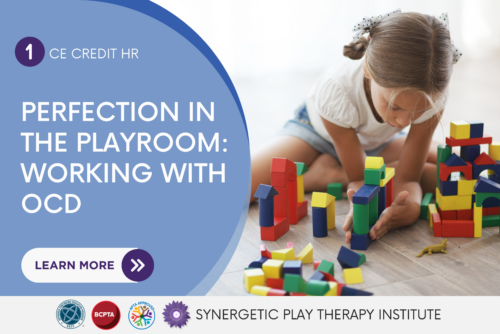 Supporting a child struggling with obsessive compulsions and perfectionism can be incredibly challenging as the desire to move the child out of their rigidity and rituals can overshadow the deeper issues and stressors driving the behaviors. In this course, you will gain an understanding of Obsessive Compulsive Disorder, the behavior of perfectionism, and how play therapy can support the integration of the underlying drivers of the behaviors so as not to intensify the inner struggle that is often experienced by these children as they attempt to stop, control and even deny the urges in their bodies.
Supporting a child struggling with obsessive compulsions and perfectionism can be incredibly challenging as the desire to move the child out of their rigidity and rituals can overshadow the deeper issues and stressors driving the behaviors. In this course, you will gain an understanding of Obsessive Compulsive Disorder, the behavior of perfectionism, and how play therapy can support the integration of the underlying drivers of the behaviors so as not to intensify the inner struggle that is often experienced by these children as they attempt to stop, control and even deny the urges in their bodies.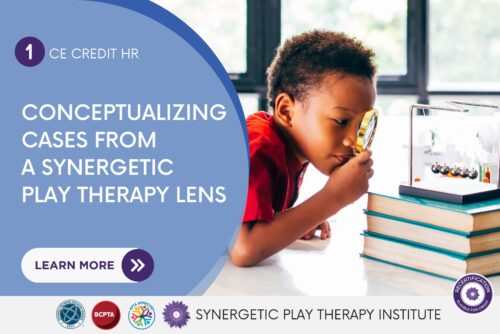 The Synergetic Play Therapy Institute® in collaboration with PIP Solutions presents “Conceptualizing Cases from a Synergetic Play Therapy® Lens”. Translating a right brain play experience into a left brain conceptualization is not an easy task. Play therapists often grapple with a sense of uncertainty when trying to comprehend a child’s unique therapeutic progression and assessing whether goals are being achieved. This course, led by Lisa Dion, aims to address this issue by introducing a structured framework derived from Synergetic Play Therapy. Students will gain insights into how to conceptualize cases effectively and apply this framework to enhance the efficacy of their therapeutic interventions.
The Synergetic Play Therapy Institute® in collaboration with PIP Solutions presents “Conceptualizing Cases from a Synergetic Play Therapy® Lens”. Translating a right brain play experience into a left brain conceptualization is not an easy task. Play therapists often grapple with a sense of uncertainty when trying to comprehend a child’s unique therapeutic progression and assessing whether goals are being achieved. This course, led by Lisa Dion, aims to address this issue by introducing a structured framework derived from Synergetic Play Therapy. Students will gain insights into how to conceptualize cases effectively and apply this framework to enhance the efficacy of their therapeutic interventions.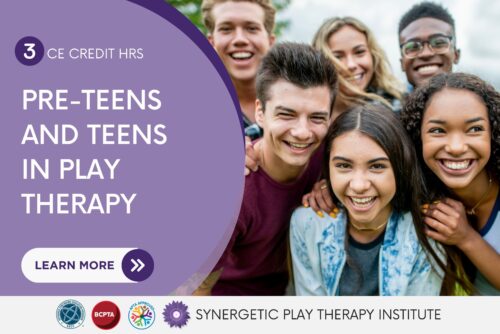 With their changing brains and hormones, finding ways to integrate play with pre-teens and teens can at times just feel “Awkward”. Learn how to navigate therapy with our clients who are no longer children, but also not quite yet adults. From twelve-year-olds to seniors in high school, adolescence is a time filled with change. This can make the notion of bringing play therapy to this population a challenge. Do we play? Do we talk? Do I ask questions? What do I do?" As such, many therapists find themselves at a loss with this age group, feeling just as confused as they do! In this workshop, play therapists will delve into the mysteries of the teenage mind as we bust myths and glean insight into how to best offer therapeutic support. Using neuroscience, Developmental, Synergetic, and Systemic theories, participants will explore how to navigate this "awkward" and sometimes "overwhelming" developmental stage using an eclectic framework of non-directive and directive play therapy approaches. Understanding how to assess the teen's emotional age, an area often missed when working with this population, will also be covered as a way to understand how to incorporate play into the therapy process. The information presented is designed to open minds and hearts as participants uncover the wisdom of the changing brain and the wisdom of the teenage years. Through lecture, demonstration, and discussion, this workshop will deconstruct this mysterious stage and support play therapists in discovering how they can help mature and remodel the teenage brain, while supporting movement towards the discovery of the authentic self- the cornerstone of the development of a teenager's identity. To get a sense for the course, check out this short video below:See course details below.
With their changing brains and hormones, finding ways to integrate play with pre-teens and teens can at times just feel “Awkward”. Learn how to navigate therapy with our clients who are no longer children, but also not quite yet adults. From twelve-year-olds to seniors in high school, adolescence is a time filled with change. This can make the notion of bringing play therapy to this population a challenge. Do we play? Do we talk? Do I ask questions? What do I do?" As such, many therapists find themselves at a loss with this age group, feeling just as confused as they do! In this workshop, play therapists will delve into the mysteries of the teenage mind as we bust myths and glean insight into how to best offer therapeutic support. Using neuroscience, Developmental, Synergetic, and Systemic theories, participants will explore how to navigate this "awkward" and sometimes "overwhelming" developmental stage using an eclectic framework of non-directive and directive play therapy approaches. Understanding how to assess the teen's emotional age, an area often missed when working with this population, will also be covered as a way to understand how to incorporate play into the therapy process. The information presented is designed to open minds and hearts as participants uncover the wisdom of the changing brain and the wisdom of the teenage years. Through lecture, demonstration, and discussion, this workshop will deconstruct this mysterious stage and support play therapists in discovering how they can help mature and remodel the teenage brain, while supporting movement towards the discovery of the authentic self- the cornerstone of the development of a teenager's identity. To get a sense for the course, check out this short video below:See course details below. Embark on an enlightening journey with Lisa Dion as she delves into strategies for optimizing the intake process! In this course, you will gain insights into how the foundation of a therapeutic relationship is laid during the intake session and how this extends throughout the entire intake and into the clinical engagement. Lisa will impart valuable lessons on structuring the intake, commencing from the initial point of contact all the way to the conclusion of the session. Witness how Lisa skillfully incorporates key themes from Synergetic Play Therapy®, such as the regulation of the nervous system and a nuanced understanding of how the brain functions, into the intake process. We will also explore the pivotal and validating role of the therapist in the playroom, emphasizing how their presence can significantly influence the dynamics of the therapeutic relationship with the client, family, and beyond.
Embark on an enlightening journey with Lisa Dion as she delves into strategies for optimizing the intake process! In this course, you will gain insights into how the foundation of a therapeutic relationship is laid during the intake session and how this extends throughout the entire intake and into the clinical engagement. Lisa will impart valuable lessons on structuring the intake, commencing from the initial point of contact all the way to the conclusion of the session. Witness how Lisa skillfully incorporates key themes from Synergetic Play Therapy®, such as the regulation of the nervous system and a nuanced understanding of how the brain functions, into the intake process. We will also explore the pivotal and validating role of the therapist in the playroom, emphasizing how their presence can significantly influence the dynamics of the therapeutic relationship with the client, family, and beyond.

